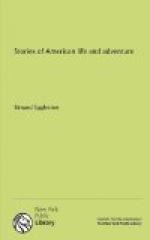When the new boy or girl was clean and bright looking, many would be willing to take charge of him or her. But there were few ready to teach a dirty, ragged little child. Sometimes no one would wish to do it. In such a case the master would offer to the one who would take such a child a reward of one of the beautiful texts of scripture which the schoolmasters of that time used to write and decorate for the children. Or he would give him one of the pictures of birds which he was accustomed to paint with his own hands.
The old Pennsylvania teachers were fond of making these tickets with pictures and writing on them. The pictures which we have here will show you what they looked like. The writing is in German, as you will see.
Whenever one of the younger scholars succeeded in learning his A, B, C, Christopher Dock would send word to the father of the child to give him a penny, and he would ask his mother to cook two eggs for him as a treat. These were fine rewards for poor children in a new country.
At certain stages in his studies, the industrious child in one of Dock’s schools would receive a penny from his father, and eat two eggs cooked by his mother. But all this time he was not counted a member of the school. He was only on trial. The day on which a boy or girl began to read was a great day. If the pupil had been diligent in spelling, the morning after the first reading day, the master would give him a ticket carefully written with his own hand. This ticket read “Industrious—One Penny.” This showed that the scholar was now really received into the school. But if he afterward became idle or disobedient, Schoolmaster Dock would take away his token.
There were no clocks or watches in the country. The children came to school, one after another taking their places near the master, who sat writing. They spent their time reading until all were there. But every one who succeeded in reading his passage without mistake stopped reading, and came and sat at the writing table to write. The poor fellow who remained last on the bench was called the Lazy Scholar.
Every Lazy Scholar had his name written on the blackboard. If a child at any time failed to read correctly, he was sent back to study his passage, and called again after a while. If he failed a second or a third time, all the scholars cried out, “Lazy!” Then his name was written on the blackboard. Then all the poor Lazy Scholar’s friends went to work to teach him to read his lesson correctly. And if his name should not be rubbed off the board before school was dismissed, all the scholars might write it down, and take it home with them. But if he could read well before school was out, the scholars, at the bidding of the master, called out, “Industrious!” and then his name was rubbed off the board.
The funniest of Dock’s rewards was that which he gave to those who made no mistake in their lessons. He marked a large O with chalk on the hand of the perfect scholar. Fancy what a time the boys and girls must have had, trying to go home without rubbing out this O.




